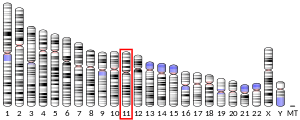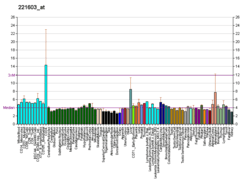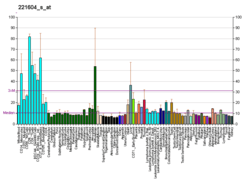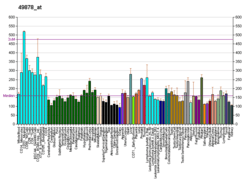PEX16
Peroxisomal membrane protein PEX16 is a protein that in humans is encoded by the PEX16 gene.[5][6]
Function
The protein encoded by this gene is an integral peroxisomal membrane protein. An inactivating nonsense mutation localized to this gene was observed in a patient with Zellweger syndrome of the complementation group CGD/CG9. Expression of this gene product morphologically and biochemically restores the formation of new peroxisomes, suggesting a role in peroxisome organization and biogenesis. Alternative splicing has been observed for this gene and two variants have been described.[6]
Interactions
PEX16 has been shown to interact with PEX19.[7]
gollark: ddg! heavserber
gollark: @discord team bad
gollark: Thus discord team bad?
gollark: The bot can just do it programmatically.
gollark: YOu can also, well, individually do that.
References
- GRCh38: Ensembl release 89: ENSG00000121680 - Ensembl, May 2017
- GRCm38: Ensembl release 89: ENSMUSG00000027222 - Ensembl, May 2017
- "Human PubMed Reference:". National Center for Biotechnology Information, U.S. National Library of Medicine.
- "Mouse PubMed Reference:". National Center for Biotechnology Information, U.S. National Library of Medicine.
- South ST, Gould SJ (Mar 1999). "Peroxisome Synthesis in the Absence of Preexisting Peroxisomes". J Cell Biol. 144 (2): 255–66. doi:10.1083/jcb.144.2.255. PMC 2132891. PMID 9922452.
- "Entrez Gene: PEX16 peroxisomal biogenesis factor 16".
- Fransen, M; Wylin T; Brees C; Mannaerts G P; Van Veldhoven P P (Jul 2001). "Human Pex19p Binds Peroxisomal Integral Membrane Proteins at Regions Distinct from Their Sorting Sequences". Mol. Cell. Biol. 21 (13): 4413–24. doi:10.1128/MCB.21.13.4413-4424.2001. ISSN 0270-7306. PMC 87101. PMID 11390669.
Further reading
- Honsho M, Tamura S, Shimozawa N, et al. (1999). "Mutation in PEX16 is causal in the peroxisome-deficient Zellweger syndrome of complementation group D". Am. J. Hum. Genet. 63 (6): 1622–30. doi:10.1086/302161. PMC 1377633. PMID 9837814.
- Sacksteder KA, Jones JM, South ST, et al. (2000). "Pex19 Binds Multiple Peroxisomal Membrane Proteins, Is Predominantly Cytoplasmic, and Is Required for Peroxisome Membrane Synthesis". J. Cell Biol. 148 (5): 931–44. doi:10.1083/jcb.148.5.931. PMC 2174547. PMID 10704444.
- Fransen M, Wylin T, Brees C, et al. (2001). "Human Pex19p Binds Peroxisomal Integral Membrane Proteins at Regions Distinct from Their Sorting Sequences". Mol. Cell. Biol. 21 (13): 4413–24. doi:10.1128/MCB.21.13.4413-4424.2001. PMC 87101. PMID 11390669.
- Shimozawa N, Nagase T, Takemoto Y, et al. (2002). "A novel aberrant splicing mutation of the PEX16 gene in two patients with Zellweger syndrome". Biochem. Biophys. Res. Commun. 292 (1): 109–12. doi:10.1006/bbrc.2002.6642. PMID 11890679.
- Fransen M, Brees C, Ghys K, et al. (2002). "Analysis of mammalian peroxin interactions using a non-transcription-based bacterial two-hybrid assay". Mol. Cell. Proteomics. 1 (3): 243–52. doi:10.1074/mcp.M100025-MCP200. PMID 12096124.
- Honsho M, Hiroshige T, Fujiki Y (2003). "The membrane biogenesis peroxin Pex16p. Topogenesis and functional roles in peroxisomal membrane assembly". J. Biol. Chem. 277 (46): 44513–24. doi:10.1074/jbc.M206139200. PMID 12223482.
- Strausberg RL, Feingold EA, Grouse LH, et al. (2003). "Generation and initial analysis of more than 15,000 full-length human and mouse cDNA sequences". Proc. Natl. Acad. Sci. U.S.A. 99 (26): 16899–903. Bibcode:2002PNAS...9916899M. doi:10.1073/pnas.242603899. PMC 139241. PMID 12477932.
- Jones JM, Morrell JC, Gould SJ (2004). "PEX19 is a predominantly cytosolic chaperone and import receptor for class 1 peroxisomal membrane proteins". J. Cell Biol. 164 (1): 57–67. doi:10.1083/jcb.200304111. PMC 2171958. PMID 14709540.
- Gerhard DS, Wagner L, Feingold EA, et al. (2004). "The Status, Quality, and Expansion of the NIH Full-Length cDNA Project: The Mammalian Gene Collection (MGC)". Genome Res. 14 (10B): 2121–7. doi:10.1101/gr.2596504. PMC 528928. PMID 15489334.
- Fransen M, Vastiau I, Brees C, et al. (2005). "Analysis of human Pex19p's domain structure by pentapeptide scanning mutagenesis". J. Mol. Biol. 346 (5): 1275–86. doi:10.1016/j.jmb.2005.01.013. PMID 15713480.
- Brocard CB, Boucher KK, Jedeszko C, et al. (2005). "Requirement for microtubules and dynein motors in the earliest stages of peroxisome biogenesis". Traffic. 6 (5): 386–95. doi:10.1111/j.1600-0854.2005.00283.x. PMID 15813749.
- Rual JF, Venkatesan K, Hao T, et al. (2005). "Towards a proteome-scale map of the human protein-protein interaction network". Nature. 437 (7062): 1173–8. Bibcode:2005Natur.437.1173R. doi:10.1038/nature04209. PMID 16189514.
- Kim PK, Mullen RT, Schumann U, Lippincott-Schwartz J (2006). "The origin and maintenance of mammalian peroxisomes involves a de novo PEX16-dependent pathway from the ER". J. Cell Biol. 173 (4): 521–32. doi:10.1083/jcb.200601036. PMC 2063862. PMID 16717127.
External links
- GeneReviews/NCBI/NIH/UW entry on Peroxisome Biogenesis Disorders, Zellweger Syndrome Spectrum
- OMIM entries on Peroxisome Biogenesis Disorders, Zellweger Syndrome Spectrum
This article is issued from Wikipedia. The text is licensed under Creative Commons - Attribution - Sharealike. Additional terms may apply for the media files.






